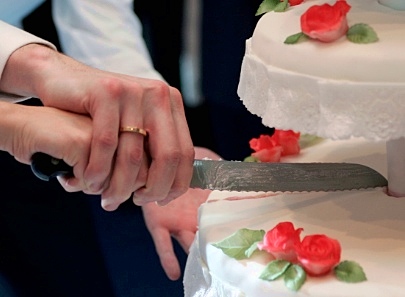How long is the process to get married?
All dioceses require couples to spend a significant amount of time preparing for the sacrament of marriage.
Oct 14, 2015

Q: How long does it take to prepare for the Sacrament of Matrimony?
INITIAL INTERVIEW
Length of preparation
All dioceses require couples to spend a significant amount of time preparing for the sacrament of marriage. Most often, couples are required to have an initial face to face meeting with the priest or deacon at least six months before their wedding. A growing trend is to ask couples to complete their marriage preparation programmes at least six weeks before their wedding. This allows for the final phase to be spent in more direct spiritual preparation, i.e. pastoral sessions with the priest or deacon, planning their wedding liturgy, and prayer.
Tone and Content
The priest or deacon welcomes the couple, gets to know them a little, and does a preliminary assessment of possible impediments to the marriage. If there are no obvious impediments, the couple continues the process. If this is a second marriage, one partner is not Catholic, or other special circumstances exist, the discussion may continue in a second interview. If a delay is necessary to deal with impediments, the couple is advised on how to proceed.
Setting the Date
When the initial interview does not indicate any impediments, most dioceses allow the wedding date to be set. If an annulment is not final, or there is another impediment, a date cannot be set, until the impediment is removed. Some dioceses ask that only a tentative date be set even for couples without obvious impediments. The wedding date is then confirmed after the couple participates in a marriage preparation programme.
Beyond the Priest
Marriage preparation is perceived as most valuable when it is administered by a team. That team should always include a member of the clergy, for couples consistently judge the presence of clergy valuable, and their absence detrimental. It should also always include lay couples, for a recurring complaint is that priests who don’t marry just don’t know what it is like. All policies assume that the formational sessions are led by trained married couples, many times with a priest as a member of that team also.
When there are no known impediments or issues that might delay a wedding, some policies offer suggestions to reinforce the couple’s connection with the parish. For example, bulletins can announce upcoming wedding(s) and ask parishioners to pray for the couple(s). Petitions can be added to the General Intercessions; the priest may publicly recognize engaged couples at the beginning of Mass, or photos of engaged couples can be put in the vestibule or in a parish newsletter.
SPECIAL CIRCUMSTANCES
Part of what a successful marriage requires a couple to be is mature, responsible, and free. Christian marriage requires that the dimension of faith also be present in a couple’s relationship. Since each couple is unique, there is no single, objective standard by which one can judge a couple’s readiness to marry, nor guarantee the success of their marriage. However, specific, identifiable special circumstances may be present which indicate a need for further assessment and growth before the final decision is made to proceed with the marriage.
Some impediments (such as mixed religion) are resolved simply by obtaining the proper dispensation from the local ordinary.
Other impediments, such as a previous marriage, may take months or years to resolve. The list of special circumstances is drawn from various diocesan policies. Most dioceses mention most of these. No diocese lists all of them. Typical commentaries are listed under each category, with special attention to mixed religion and previous marriages, since these are the more complicated and sensitive issues.
Many policies ground their discussion of special circumstances in the 1983 Code of Canon Law that states “all persons not prohibited by law can contract marriage” (c. 1058) and “before marriage is celebrated, it must be evident that nothing stands in the way of its valid and licit celebration” (c.1066).
It does, however, empower the local ordinary to “prohibit marriage, but only for a time or a serious cause and as long as that cause exists” (c 1077). In addition to canonical requirements, the policies usually emphasize the increased pastoral care and attention the Church desires to give the couple so that their marriage will be as strong as possible. Most policies make provision for appeal to the bishop if a couple disputes a decision to delay or deny a marriage.
--To be continued next week







Total Comments:0